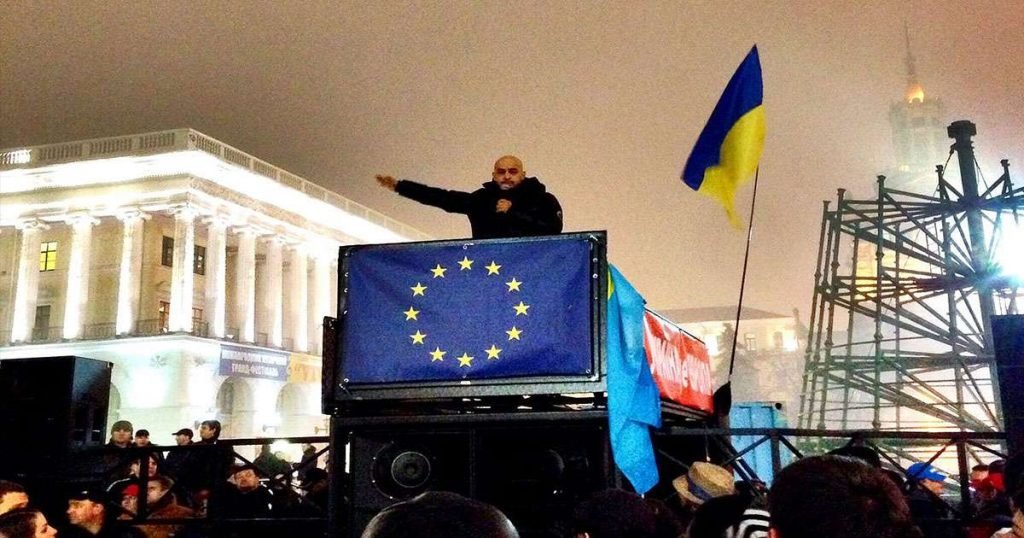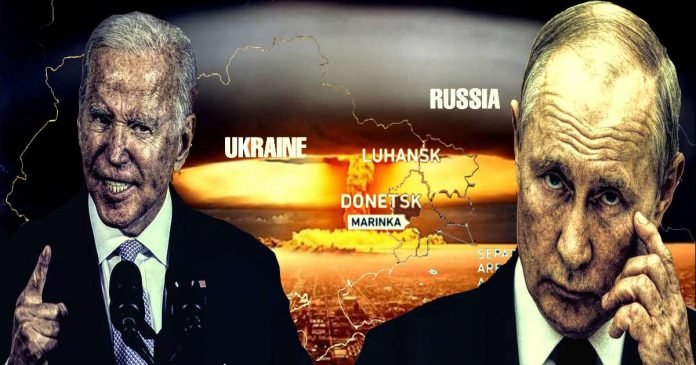A version of this article first appeared on March 2, 2015.
By Robert Parry
Consortium News
The United States and Russia still maintain vast nuclear arsenals of mutual assured destruction, putting the future of humanity in jeopardy every instant. But an unnerving nonchalance has settled over the American side which has become so casual about the risk of cataclysmic war that the West’s propaganda and passions now ignore Russian fears and sensitivities.
A swaggering goofiness has come to dominate how the United States reacts to Russia, with American politicians and journalists dashing off tweets and op-eds, rushing to judgment about the perfidy of Moscow’s leaders, blaming them for almost anything and everything.
These days, playing with nuclear fire is seen as a sign of seriousness and courage. Anyone who urges caution and suggests there might be two sides to the U.S.-Russia story is dismissed as a wimp or a stooge. A what-me-worry “group think” has taken hold across the U.S. ideological spectrum. Fretting about nuclear annihilation is so 1960s.
Over the weekend, I participated in a conference on nuclear dangers sponsored by the Helen Caldicott Foundation in New York City. On my Saturday afternoon panel was Seth Baum of the Global Catastrophic Risk Institute who offered a sobering look at how the percentage chances of a nuclear war though perhaps low at any given moment add up over time to quite likely if not inevitable. He made the additional observation that those doomsday odds rise at times of high tensions between the United States and Russia.
As Baum noted, at such crisis moments, the people responsible for the U.S. and Russian nuclear weapons are more likely to read a possible computer glitch or some other false alarm as a genuine launch and are thus more likely to push their own nuclear button.
In other words, it makes good sense to avoid a replay of the Cuban Missile Crisis in reverse by edging U.S. nuclear weapons up against Russia’s borders, especially when U.S. politicians and commentators are engaging in Cold War-style Russia-bashing. Baiting the Russian bear may seem like great fun to the tough-talking politicians in Washington or the editors of The New York Times and Washington Post but this hostile rhetoric could be taken more seriously in Moscow.
When I spoke to the nuclear conference, I noted how the U.S. media/political system had helped create just that sort of crisis in Ukraine, with every “important” person jumping in on the side of the Kiev coup-makers in February 2014 when they overthrew elected President Viktor Yanukovych.
Since then, nearly every detail of that conflict has been seen through the prism of “our side good/their side bad.” Facts that put “our side” in a negative light, such as the key role played by neo-Nazis and the Kiev regime’s brutal “anti-terrorism operation,” are downplayed or ignored.
Conversely, anything that makes the Ukrainians who are resisting Kiev’s authority look bad gets hyped and even invented, such as one New York Times’ lead story citing photos that supposedly proved Russian military involvement but quickly turned out to be fraudulent. [See Consortium News‘ “NYT Retracts Russian Photo Scoop.”]
At pivotal moments in the crisis, such as the Feb. 20, 2014 sniper fire that killed both police and protesters and the July 17, 2014 shoot-down of Malaysia Airlines Flight 17 killing 298 passengers and crew, the U.S. political/media establishment has immediately pinned the blame on Yanukovych, the ethnic Russian rebels who are resisting his ouster, or Putin.
Then, when evidence emerged going in the opposite direction — toward “our side” — a studied silence followed, allowing the earlier propaganda to stay in place as part of the preferred storyline. [See, for instance, Consortium News‘s “President Gollum’s ‘Precious’ Secrets.”]
A Pedestrian Dispute

Many opposition leaders called for protest via Facebook and Twitter and later on the representatives of the opposition and pro-EU parties were the ones to lead the protests. Link
One of the points of my talk was that the Ukrainian crisis emerged from a fairly pedestrian dispute, i.e., plans for expanding economic ties with the European Union while not destroying the historic business relationship with Russia. In November 2013, Yanukovych backed away from signing an EU association agreement when experts in Kiev announced that it would blow a $160 billion hole in Ukraine’s economy. He asked for more time.
But Yanukovych’s decision disappointed many western Ukrainians who favored the EU agreement. Tens of thousands poured into Kiev’s Maidan square to protest. The demonstrations then were seized upon by far-right Ukrainian political forces who have long detested the country’s ethnic Russians in the east and began dispatching organized “sotins” of 100 fighters each to begin firebombing police and seizing government buildings.
As the violence grew worse, U.S. neoconservatives also saw an opportunity, including Sen. John McCain, R-Arizona, who told the protesters the United States was on their side, and Assistant Secretary of State for European Affairs Victoria Nuland, who passed out cookies to the protesters and plotted with U.S. Ambassador Geoffrey Pyatt on who would become the new leaders of Ukraine. [See Consortium News‘s “NYT Still Pretends No Coup in Ukraine.“]
Thus, a very manageable political problem in Ukraine was allowed to expand into a proxy war between nuclear-armed United States and Russia. Added to it were intense passions and extensive propaganda. In the West, the Ukraine crisis was presented as a morality play of people who “share our values” pitted against conniving Russians and their Hitler-like president Putin.
In Official Washington, anyone who dared suggest compromise was dismissed as a modern-day Neville Chamberlain practising “appeasement.” Everyone “serious” was set on stopping Putin now by shipping sophisticated weapons to the Ukrainian government so it could do battle against “Russian aggression.”
The war fever was such that no one raised an eyebrow when Ukraine’s Deputy Foreign Minister Vadym Prystaiko told Canada’s CBC Radio last month that the West should no longer fear fighting nuclear-armed Russia and that Ukraine wanted arms for a “full-scale war” against Moscow.
“Everybody is afraid of fighting with a nuclear state. We are not anymore, in Ukraine,” Prystaiko said. “However dangerous it sounds, we have to stop [Putin] somehow. For the sake of the Russian nation as well, not just for the Ukrainians and Europe. What we expect from the world is that the world will stiffen up in the spine a little.” [See Consortium News’s “Ready for Nuclear War over Ukraine?”]
Instead of condemning Prystaiko’s recklessness, more U.S. officials began lining up in support of sending lethal military hardware to Ukraine so it could fight Russia, including Director of National Intelligence James Clapper who said he favoured the idea though it might provoke a “negative reaction” from Moscow.
Russian Regime Change
Even President Barack Obama and other U.S. leaders who have yet to publicly endorse arming the Kiev coup-makers enjoy boasting about how much pain they are inflicting on the Russian economy and its government. In effect, there is a U.S. strategy of making the Russian economy “scream,” a first step toward a larger neocon goal to achieve “regime change” in Moscow.
Another point I made in my talk on Saturday was how the neocons are good at drafting “regime change” plans that sound great when discussed at a think tank or outlined on an op-ed page but often fail to survive in the real world, such as their 2003 plan for a smooth transition in Iraq to replace Saddam Hussein with someone of their choosing except that it didn’t work out that way.
Perhaps the greatest danger from the new neocon dream for “regime change” in Moscow is that whoever follows Putin might not be the pliable yes man that the neocons envision, but a fierce Russian nationalist who would suddenly have control of their nuclear launch codes and might decide that it’s time for the United States to make concessions or face annihilation.
On March 3, The Washington Post‘s neocon editorialists emphasized the need for ousting Putin as they anti-Putin activists who have urged an escalation of Western pressure on Russia. The Post wrote: “They say he [Putin] can be stopped only by steps that decisively raise the cost of his military aggression and cripple the financial system that sustains his regime.”
Yet, what I find truly remarkable about the Ukraine crisis is that it was always relatively simple to resolve: Before the coup, Yanukovych agreed to reduced powers and early elections so he could be voted out of office. Then, either he or some new leadership could have crafted an economic arrangement that expanded ties to the EU while not severing them with Russia.
Even after the coup, the new regime could have negotiated a federalized system that granted more independence to the disenfranchised ethnic Russians of eastern Ukraine, rather than launch a brutal “anti-terrorist operation” against those resisting the new authorities. But Official Washington’s “group think” has been single-minded: only bellicose anti-Russian sentiments are permitted and no suggestions of accommodation are allowed.
Still, spending time this weekend with people like Helen Caldicott, an Australian physician who has committed much of her life to campaigning against nuclear weapons, reminded me that this devil-may-care attitude toward a showdown with Russia, which has gripped the U.S. political/media establishment, is not universal. Not everyone agrees with Official Washington’s nonchalance about playing a tough-guy game of nuclear chicken.
As part of the conference, Caldicott asked attendees to stay around for a late-afternoon showing of the 1959 movie, On the Beach, which tells the story of the last survivors from a nuclear war as they prepare to die when the radioactive cloud that has eliminated life everywhere else finally reaches Australia. A mystery in the movie is how the final war began, who started it and why with the best guess being that some radar operator somewhere thought he saw something and someone reacted in haste.
Watching the movie reminded me that there was a time when Americans were serious about the existential threat from U.S.-Russian nuclear weapons, when there were films like Dr Strangelove, Fail Safe, and On the Beach. Now, there’s a cavalier disinterest in those risks, a self-confidence that one can put his or her political or journalistic career first and just assume that some adult will step in before the worst happens.
The late investigative reporter Robert Parry broke many of the Iran-Contra stories for The Associated Press and Newsweek in the 1980s. He founded Consortium News in 1995 as the first online, independent news site in the United States.
Help Us Sustain Ad-Free Journalism
Sorry, I Need To Put Out the Begging Bowl
Independent Journalism Needs You
Our unwavering dedication is to provide you with unbiased news, diverse perspectives, and insightful opinions. We're on a mission to ensure that those in positions of power are held accountable for their actions, but we can't do it alone. Labour Heartlands is primarily funded by me, Paul Knaggs, and by the generous contributions of readers like you. Your donations keep us going and help us uphold the principles of independent journalism. Join us in our quest for truth, transparency, and accountability – donate today and be a part of our mission!
Like everyone else, we're facing challenges, and we need your help to stay online and continue providing crucial journalism. Every contribution, no matter how small, goes a long way in helping us thrive. By becoming one of our donors, you become a vital part of our mission to uncover the truth and uphold the values of democracy.
While we maintain our independence from political affiliations, we stand united against corruption, injustice, and the erosion of free speech, truth, and democracy. We believe in the power of accurate information in a democracy, and we consider facts non-negotiable.
Your support, no matter the amount, can make a significant impact. Together, we can make a difference and continue our journey toward a more informed and just society.
Thank you for supporting Labour Heartlands













